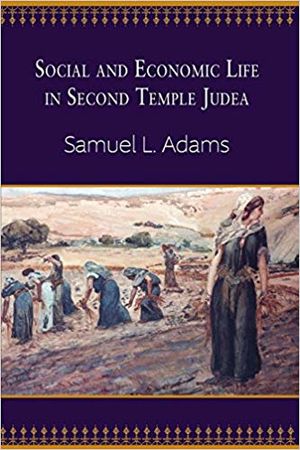Social and Economic Life in Second Temple Judea (2014 Adams), book
Social and Economic Life in Second Temple Judea (2014) is a book by Samuel L. Adams.
Abstract
"This book looks at the socioeconomic landscape of Second Temple Judea (532 BCE - 70 CE) with close attention to the daily life of ordinary people. Adams uses the Hebrew Bible and other historical resources to examine work and economic exchange, marriage and the complexities of family life--including the roles of women and children--and the burdensome taxation policies under imperial Rome. He culminates with a rich analysis of the ethics of wealth and poverty found in various texts, including the Hebrew Bible, pseudepigrapha, Dead Sea Scrolls, Q, and the New Testament. This study of socioeconomic and theological issues provides students with a helpful context for understanding religious beliefs and practices in the time of early Judaism and emerging Christianity."--Publisher description (I).
"Those who study the Bible are becoming increasingly attentive to the significance of economics when examining ancient texts and the cultures that produced them. This book looks at the socioeconomic landscape of Second Temple Judea, from the end of the Babylonian exile to the destruction of the temple by the Romans (532 BCE to 70 CE). Adams carefully examines key themes, paying special attention to family life, the status of women, and children, while engaging relevant textual and archaeological evidence. He looks at borrowing and lending and the burdensome taxation policies under a succession of colonial powers. In this pursuit, Adams offers an innovative analysis of economic life with fresh insights from biblical texts. No other study has specifically analyzed economics for this lengthy timeframe, especially in relation to these key themes. This important book provides readers with a helpful context for understanding religious beliefs and practices in the time of early Judaism and emerging Christianity."--Publisher description (II).
Editions
Published in New York, NY: Thomas Dunne Books, St. Martin's Press, 2014.
Contents
Family life and marriage. Basic household structures ; Household size and larger population estimates ; Life in the household ; Marriage : finding a partner, marriage gifts and dowry arrangements, the economics of divorce ; Summary -- The status of women and children. Roles and responsibilities of women ; The status of widows ; Children : roles and responsibilities of male offspring, roles and responsibilities of daughters ; Responsibilities toward parents ; inheritance ; Debt slavery ; Summary -- Work and financial exchanges. Occupations : the challenges of farming, animal husbandry, Other occupations ; Financial exchanges ; Borrowing and lending : Interest, the practice of surety, bribery ; Summary -- Taxation and the role of the state. Taxation in an advanced agrarian economy : anthropological perspectives ; Persian period ; Prolemaic period ; Seleucid period ; The Hasmoneans ; Roman period ; Summary -- The ethics of wealth and poverty. Ethics of wealth and poverty in the wisdom literature : contradictions in the book of Proverbs, Skepticism in the books of Job and Ecclesiastes, Ben Sira and social ethics, Second temple instructions and question of an afterlife ; Apocalyptic eschatology, economics, and social ethics : 4QInstruction and the dead sea scrolls, the epistle of Enoch and the gospel of Luke, wisdom and apocalypticism ; The question of social location ; Summary.
